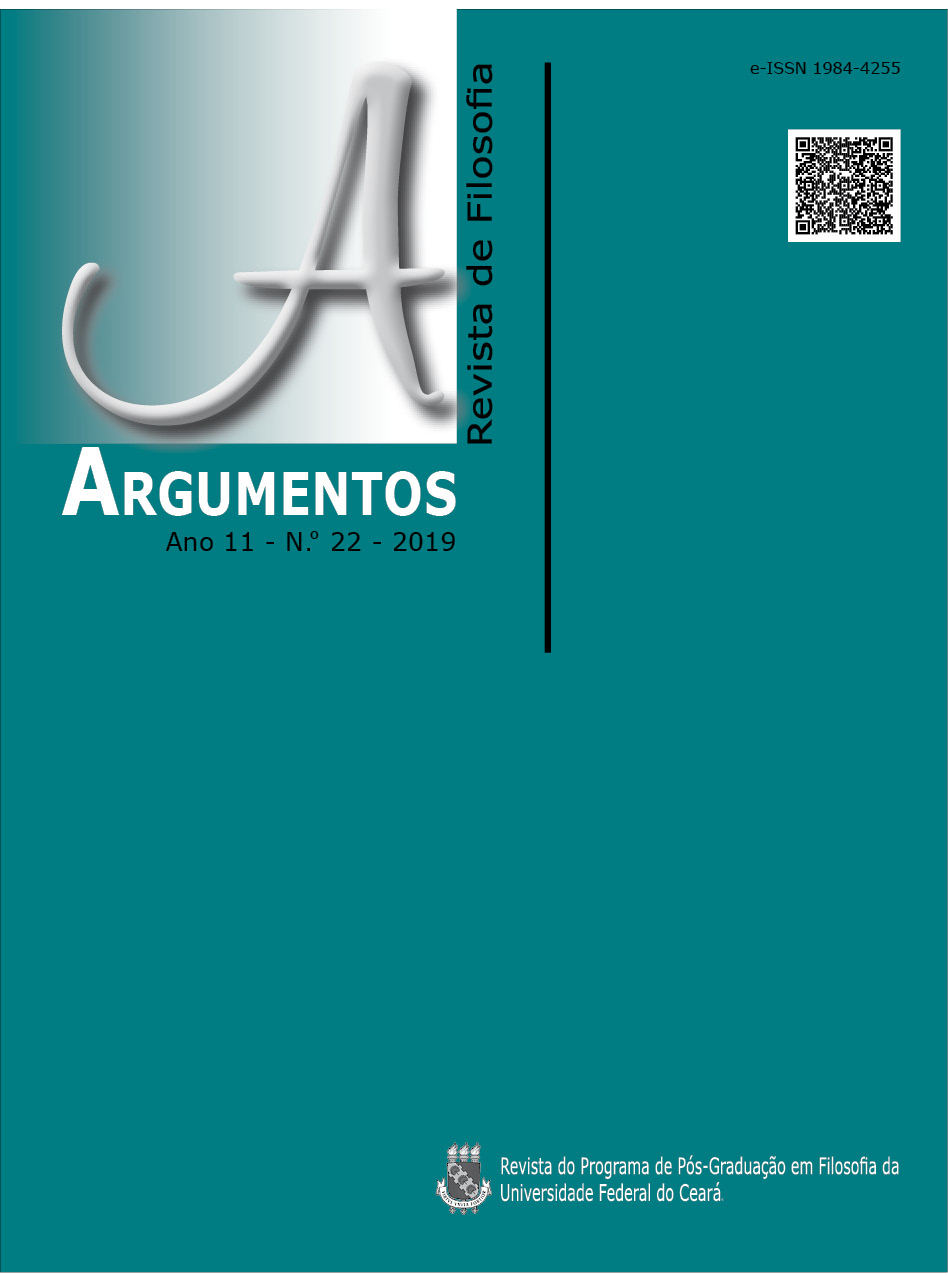Fragilidade da ação e realismo trágico em Arendt: um diálogo com Nietzsche
DOI:
https://doi.org/10.36517/Argumentos.22.14Palavras-chave:
Arendt. Nietzsche. Frágilidade. Trágico.Resumo
Existe um realismo trágico no plano de fundo de todo o pensamento arendtiano, que corresponde à sua forma de lidar com a fragilidade das questões práticas que se colocam entre os homens, sem renunciar – muito pelo contrário – à ação. Através da sua afinidade nietzschiana, busco evidenciar aquela que acredito ser a postura intelectual base de toda a reflexão político-filosófica de Hannah Arendt, que não é unicamente um subentendido, mas que aparece explícita em muitos momentos da sua produção.
Downloads
Referências
AMITRANO, Georgia. Albert Camus: um pensador em tempos sombrios. Uberlândia: EDUFU, 2014.
ARENDT, Hannah. O que é política?. Rio de Janeiro: Bertrand Brasil, 2004.
_____. Entre o passado e o futuro. São Paulo: Perspectiva, 2007.
_____. Compreender: formação, exílio e totalitarismo (ensaios 1930–1954). São Paulo: Companhia das Letras, 2008a.
_____. Crises da República. São Paulo: Perspectiva, 2008b.
_____. Homens em tempos sombrios. São Paulo: Companhia das Letras, 2008c.
_____. A vida do espírito. Rio de Janeiro: Civilização Brasileira, 2009a.
_____. A promessa da política. Rio de Janeiro: Difel, 2009b.
_____. Eichmann em Jerusalém. São Paulo: Companhia das Letras, 2009c.
_____. Origens do totalitarismo. São Paulo: Companhia das Letras, 2011.
_____. The Last Interview and other Conversations. New York: Melville House, 2013.
_____. A condição humana. Rio de Janeiro: Forense Universitária, 2014a.
_____. Más allá de la filosofía: escritos sobre cultura, arte y literatura. Ed. Fina Birulés y Àngela Lorena Fuster. Madrid: Trotta, 2014b.
BENHABIB, Seyla. The Reluctant Modernism of Hannah Arendt. Lanham, Md: Rowman & Littlefield, 2003.
BIRULÉS, Fina. Una herencia sin testamento: Hannah Arendt. Barcelona: Herder, 2007.
CAMUS, Albert. O mito de Sísifo. Rio de Janeiro: Record, 2008.
CIORAN, E. M. Cahiers, 1957-1972. Paris: Gallimard, 1997.
FORTI, Simona. Vida del espíritu y tiempo de la polis: Hannah Arendt entre filosofía y política. Madrid: Cátedra, 2001.
HEATHER, G.; STOLZ, M. Hannah Arendt and the Problem of Critical Theory. The Journal of Politics, n. 41, p. 2-22, 1979.
HEUER, Wolfgang. Amizade política pelo cuidado com o mundo: sobre política e responsabilidade na obra de Hannah Arendt. História: Questões & Debates. Curitiba: Ed. da UFPR, n. 46, p. 91-109, 2007.
ISAAC, Jeffrey C. Situating Hannah Arendt on Action and Politics. Political Theory, v. 21, n. 3, p. 534-540, Aug. 1993.
JAHANBEGLOO, Ramin. Isaiah Berlin en diálogo con Ramin Jahanbegloo. Madrid: Anaya & Mario Muchnik, 1993.
LARA, María Pía. Narrar el mal: una teoría posmetafísica del juicio reflexionante. Barcelona: Geidsa, 2009.
NIETZSCHE, Friedrich. O nascimento da tragédia. São Paulo: Companhia das Letras, 1999.
_____. A gaia ciência. São Paulo: Companhia das Letras, 2001.
_____. Segunda consideração intempestiva: da utilidade e desvantagem da história para a vida. Rio de Janeiro: Relume Dumará, 2003.
_____. A vontade de poder. Rio de Janeiro: Contraponto, 2008a.
_____. Além do bem e do mal. São Paulo: Companhia das Letras, 2008b.
PASSERIN D’ENTRÈVES, Maurizio. The Political Philosophy of Hannah Arendt. New York: Routledge, 1994.
RICOEUR, Paul. Fragilité et responsabilité. Autres Temps. Cahiers d’éthique sociale et politique, n. 76-77, p. 127-141, 2003.
ROSSET, Clément. Lógica de lo peor. Barcelona: Barral, 1976.
SAVATER, Fernando. La tarea del héroe. Madrid: Taurus, 1981.
Downloads
Publicado
Edição
Seção
Licença
Copyright (c) 2019 Argumentos - Revista de Filosofia

Este trabalho está licenciado sob uma licença Creative Commons Attribution 4.0 International License.
Autores que publicam nesta revista concordam com os seguintes termos (SOBRE COPYRIGHT E POLÍTICA DE ACESSO LIVRE):
1. Autores mantém OS DIREITOS AUTORAIS concedidos à revista OU Direito de Primeira Publicação, com o trabalho simultaneamente licenciado à Atribuição de Licença Creative Commons (CC BY) que permite o compartilhamento dos trabalhos com reconhecimento de autoria e publicação inicial nesta revista.
2. Autores têm permissão para aceitar contratos, distribuição não-exclusiva da versão do trabalho publicada nesta revista (por exemplo: publicar no repositório institucional ou como um capítulo do livro), com reconhecimento de autoria e publicação inicial nesta revista.
3. Autores têm permissão e são estimulados a publicar e distribuir seu trabalho on-line (por exemplo: em repositórios institucionais ou em sua página pessoal) mesmo durante o processo editorial, haja visto que isso pode aumentar o impacto e citação do trabalho publicado.




.jpg)










._._3.png)
1.jpg)
._._._.png)
